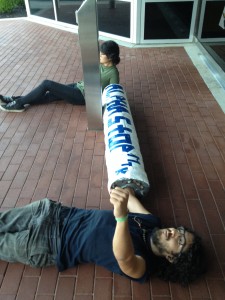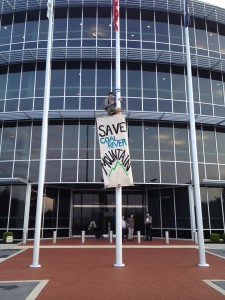“If it was easy they wouldn’t call it ‘struggle.'”
—Old anarchist saying
Not long ago, before fracking, before Keystone XL, the environmental issue in the headlines was mountaintop removal coal mining in central Appalachia.
 Mountaintop removal is a horrible practice where coal companies literally explode the tops off of mountains with the same chemical concoction that Tim McVeigh used in Oklahoma City. The companies then push the debris of fallen trees and blasted rock into Appalachia’s streams and rivers. Then, the industry “cleans” the coal in nearby processing plants putting the waste into “sludge ponds” leaving billions of gallons of coal sludge around the region.
Mountaintop removal is a horrible practice where coal companies literally explode the tops off of mountains with the same chemical concoction that Tim McVeigh used in Oklahoma City. The companies then push the debris of fallen trees and blasted rock into Appalachia’s streams and rivers. Then, the industry “cleans” the coal in nearby processing plants putting the waste into “sludge ponds” leaving billions of gallons of coal sludge around the region.
Not only are the forests, mountains and animals living on them devastated by the practice, but people living near the mine sites are exposed to air and water pollution, amongst other things. The impact of doing this in populated areas makes mountaintop removal one of the most egregious environmental justice issues in North America today.
Furthermore, this damage done to the environment and people living in it is to power America’s power grid and keep the electricity going to our homes cheap.
Ten years ago, small community groups living in the “sacrifice zone” teamed up with grassroots direct action groups to launch the first Mountain Justice Summer (MJS). In MJS, activists from across the country spent the summer in Appalachia organizing against mountaintop removal coal mining. Over the years, hundreds of activists have been arrested in mine site occupations, office disruptions, tree-sits, mass protests at the White House and various other locations. Law suits have been filed and won. Politicians, bureaucrats, bankers and mining execs have been petitioned, lobbied and bird-dogged over the years.
Yet mountaintop removal still continues.
 Since then, other anti-extraction campaigns and movements have emerged to fight tar sands pipelines, Northwest coal exports and fracking across the country.
Since then, other anti-extraction campaigns and movements have emerged to fight tar sands pipelines, Northwest coal exports and fracking across the country.
But Appalachia’s mountain fighters persevere. This week, on the tenth anniversary of the first Mountain Justice Summer, eight activists were arrested blockading and disrupting the largest mining company operating in Appalachia, Alpha Natural Resources, offices in Bristol Virginia.
The legal process has been slow and arduous in Virginia and the eight mountain fighters have spent days in jail merely awaiting bail hearings. As of Friday, two of them still remain in jail (BTW, donate to the legal fund!).
While many of the activities (emails, petitions, big marches, etc.) that the well-funded climate establishment is engaged in has become a good access point for a greater number of people and create much earned and social media, these activities are already factored into the power-holder’s formula for maintaining the existing political economy.
In other words, more is needed.
In building a movement to scale to confront the worst consequences of climate change, increased fossil fuel extraction and the destruction of Appalachia’s Mountains, more bold and effective action that includes struggle and sacrifice must happen.
Like forest defenders in the eighties and nineties, the Tar Sands Blockade in Texas and Oklahoma, the Michigan Coalition Against Tar Sands, and tar sands resisters currently camped out in eastern Utah, Appalachia’s mountain fighters are participating in a “long haul” struggle to stop resource extraction at the point of operation and destruction. Their activities disrupt business as usual, add to the companies’ operating cost and, more often than not, risk a harsher backlash.
It’s not easy and the struggle is far from over.
Images
Top: Activists blockade Alpha’s offices in Bristol, VA
Bottom: Activist climbs and deploys a banner on a flagpole outside of Alpha’s HQ in Bristol, VA